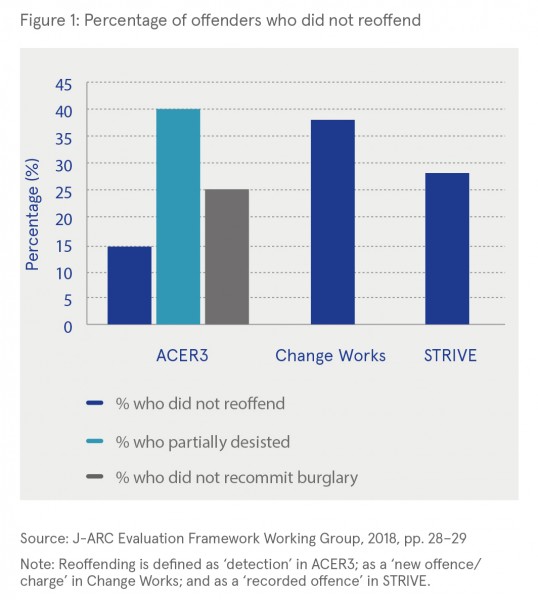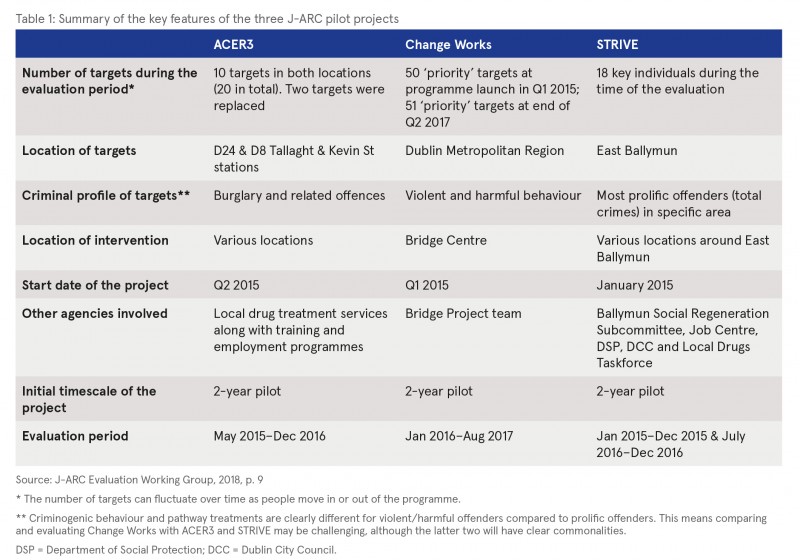Guiney, Ciara (2019) Evaluation of three J-ARC pilot projects. Drugnet Ireland, Issue 69, Spring 2019, pp. 19-20.
| Preview | Title | Contact |
|---|---|---|
|
PDF (Drugnet Ireland 69)
1MB |
The Joint Agency Response to Crime (J-ARC) is a multiagency response to the management and rehabilitation of offenders. It was established by An Garda Síochána, the Irish Prison Service, the Probation Service, and the Department of Justice and Equality in 2014. The main aim of J-ARC is to stop crime and increase safety in society by targeting prolific offenders that are considered guilty of the majority of crimes. J-ARC presented the findings of an evaluation of the effectiveness of three pilot initiatives – ACER3, STRIVE, and Change Works – that were developed to reduce offending behaviour.1 Table 1 provides an overview of the main features of the three programmes.
Methodology
The evaluation involved a desk-based review, although a mixed methods approach was utilised across programmes and included structured surveys, face-to-face interviews with clients and practitioners, focus groups observation, and case studies.
Results
Despite the small sample sizes, the available data allowed for an in-depth analysis of whether or not J-ARC was operating efficiently. The main finding was that J-ARC programmes were having a positive impact on offenders. Figure 1 shows the percentage of offenders who did not reoffend across the three J-ARC projects. The proportion of targets that did not reoffend was highest for Change Works, followed by STRIVE, then ACER3. It was not possible to determine which programme was more successful statistically. Other issues that also made comparison between programmes difficult included operational definitions for reoffending, evaluation periods, and differing offences targeted across projects.
Limitations
As acknowledged by the authors, a number of limitations were evident across the programmes.
- Sample sizes were small; hence, it was difficult to make strong statistical conclusions.
- No evaluation plan was identified at the start; hence, data collected were not gathered with evaluation in mind.
- No control group was utilised, so it was not possible to compare outcomes between those that received the intervention and those that did not.
Despite these limitations, it is important to note that these evaluations were the first ones carried out by J-ARC and were done when the programme was still in development phase. The outcomes of these evaluations will inform the existing evidence base for future evaluations.
Recommendations
Based on the evaluations of the three programmes, a number of recommendations were made that could be applied across J-ARC projects.
- The programme should be continued and expanded.
- The existing resources should be reviewed to enable an increase in J-ARC targets.
- Procedures should be developed to allow effective evaluation, data collection, and monitoring of J-ARC targets.
- There should be outcome monitoring and agreement on operational definitions.
- There should be a cost analysis of the J-ARC project.
- The initial selection and deselection should be reviewed and monitored.
- There should be clarification of the lead agency role and implementation of a process to consider changes in responsibility as the target status evolves.
- A secure and visible IT system should be in place to enable information sharing.
- There should be a clear benefits model outlining services available to targets.
- There should be early identification and involvement of stakeholders.
- An evaluation framework should be developed for future J-ARC projects.
- There should be training and communication to increase awareness and normality of J-ARC.


1. J-ARC Evaluation Framework Working Group (2018) Critical review of initial evaluations on the three J-ARC pilot projects. Dublin: Department of Justice and Equality. https://www.drugsandalcohol.ie/29722/
MM-MO Crime and law > Crime deterrence
MM-MO Crime and law > Justice system > Community anti-crime or assistance programme
MP-MR Policy, planning, economics, work and social services > Programme planning, implementation, and evaluation > Programme evaluation
T Demographic characteristics > Person who commits a criminal offence (offender)
VA Geographic area > Europe > Ireland
Repository Staff Only: item control page